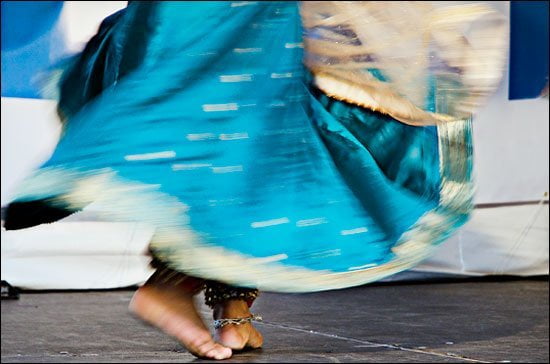
While India celebrates femininity in so many aspects of its culture, a dichotomy also exists. Discrimination against women has led to atrocious acts against travellers and Indian citizens. (Julia Pelish/Vacay.ca)
Column by Adrian Brijbassi
Vacay.ca Managing Editor
My friend Mariellen Ward has written on her outstanding blog, Breathedreamgo.com, that the media is guilty of sensationalism in the coverage of rapes in India.
Although Mariellen’s points are brilliantly and thoughtfully articulated, I disagree with her assessment. The attention the media is giving to the rape epidemic in India is long, long overdue. I don’t call it sensationalism, I call it scrutiny. And I want the media to continue to report on the crimes against women, as well as the misogyny that exists within the culture of India, where female babies are killed at an alarming rate because too many fathers still see daughters as a burden, not a gift.
That depraved practice has led to a female-to-male ratio of 914-to-1,000, according to India Times. Such an unnatural skew creates a disturbing imbalance. Combine that disproportion with poverty and a legal system that casually turns a blind eye on crimes against women and you are confronted with stomach-turning facts about rape. A popularly reported figure states that one woman in India is raped every 20 minutes, according to the nation’s crime bureau. That’s a conservative number because many rapes do go undocumented. Worse, more than 7,200 children are rape victims each year, a BBC report says.
As a Canadian, should you be scared? Not really. As Mariellen points out, and as I agree, travel is a safe and rewarding experience for the overwhelming majority of travellers — no matter where we go. But ask, Is India as safe to travel as anywhere else? The answer is no, it’s not.
According to statistics from Canada’s Department of Foreign Affairs, the violent crime rate against Canadian travellers in India is much higher than in most other popular destinations. For every 100,000 Canadians who visit India, 7.5 of them are violently assaulted or murdered. By comparison, Mexico has a rate of 3.1 such incidents for every 100,000 Canadian travellers and the United States is at a rate of 0.09 for every 100,000.
Why are these statistics more relevant and believable than the numbers that show India’s per-capita rape count is roughly the same as Canada’s (1.8 vs. 1.7 for every 100,000 people)?
Because the Department of Foreign Affairs’ statistics come from one agency while international statistics rely on accuracy from each nation, and rapes are grossly underreported in India and some other developing nations where politicians and police are not watched as carefully as they are in countries where the rule of law can usurp the will of rulers. While reports say that rape is the fastest-growing crime in India, it’s more accurate to say it is the country’s fastest-growing reported crime. Indian women are, thankfully, adopting the idea that they should speak out.
Yes, there are more dangerous places than India, and yes, in a nation of 1.2 billion people the cumulative amount of crime will be greater than just about every other country. But when more than 635 rapes are reported in Delhi, as occurred last year, and only one case sees a conviction, there is something criminal in both the streets of the nation and its legislature.
Sustained media scrutiny from Europe, Canada, Australia, the United States and elsewhere will eventually lead to action. If that helps give women in India the protection they need from their would-be attackers and the attention of lawmakers who haven’t shown enough care, then we should welcome more media attention on this ugly aspect of the country — not less.
If the definition of news is coverage of a situation out of the ordinary, then attempts to persuade the media that what is happening in India isn’t unusual in a global context actually works against the best interests of the women of that nation. The argument that it (violence against women) happens everywhere, so India shouldn’t be chastised if South Africa isn’t only serves to maintain the status quo. It allows the police and the legislators who are facing pressure to argue “we’re no worse than anyone else, so stop picking on us.”
Use Your Travel Dollars to Send a Message to India
What does this mean for travellers to India?
For one thing, it means you need to understand that India is the most romanticized developing nation on the planet. Its marketing efforts are pinned on the Taj Mahal — the world’s greatest symbol of one man’s love for one woman — and the laudable aspects of its culture, including its deep spirituality that has spurred an industry around yoga travel and the beautiful legacy of non-aggression left by Mohandas Gandhi.
That’s the veneer. It’s the salespitch that entices you to commit your travel dollars to come. The reality is that it’s a spectacular country filled with amazing people who are likely to welcome you into their villages as if you are an honoured guest sent to them by divine intervention. Such displays of human kindness will move you to your soul. But there is an element of the population that is misogynistic, cruel and demeaning, and far too often the men who express those violent traits see their actions go unpunished.
Does the same element exist everywhere else in the world? Yes. Cruelty is part of human nature. The difference with India is violence against women is tolerated to a degree far beyond what you will find in any other nation that is aggressively seeking you to visit.
This year, don’t go to India. Not because you should be scared to, but because you too can put pressure on the government to make changes by spending your travel dollars elsewhere.
Roughly 200,000 Canadians travel to India each year and we spend more than $200 million there. Perhaps by taking your money and your presence away we can do to those imperious men of India what they’ve done to too many of its women for too long: shame them.
All men want to feel attractive to what attracts them. What attracts politicians in India is dollars and praise from the west. Take both away and replace them with criticism and scorn, and change just might arrive in time to save that young woman about to walk onto a bus filled with hands wringing with malice, or into a hotel room she may not know has recently been unlocked, or through a forest littered with covetous eyes, or into the office of a teacher or employer or doctor or any other man who may never have had to confront the notion of consequence — until now.







2 Comments
Rob K
May 1, 2013 at 6:39 pmWhat a load of BS – “For every 100,000 Canadians who visit India, 7.5 of them are violently assaulted or murdered”. Don’t count all the rural villagers from India who have settled in Canada and every now and then when they travel back, some of them are subjected to hate crimes within their families. Yes, rapes do happen but as a traveler if you are just a little careful, no one touches you. Men from impoverished backgrounds commit these crimes on their women which is a shame but it will only go away only with the right education at the young age. People should be encouraged to travel to India as it only inspires more people to help the needy. It’s a country blessed with so much and everyone must visit India at least once (even more) in their lifetime.
Rakesh Bhasin
October 10, 2013 at 1:45 pmMr Adrian Brijbassi,
This is a bagful of non-sense. I feel you are a biased person…..When did you visit India last? Were you a victim of any crime against you or your family? Get off that high horse of yours & get real.
I in no way approve of the crimes, specially against women but remember RAPES happen all over the world. It is an epidemic which needs to be controlled but in noway does it mean that tourists from the western world do not travel to India. They need to take adequate care to avoid any problem areas.
India has much more to offer than just the TAJ MAHAL. Seems you have no idea what else it has for tourists to see. I am a tourism professional and have travelled with hundreds of satisfied tourists to India. There has never been any incident like you mentioned. As long as you are careful you can have a very enjoyable & rewarding experience traveling through India.